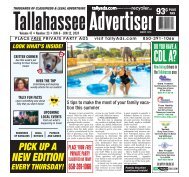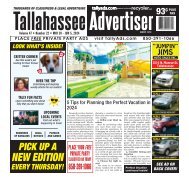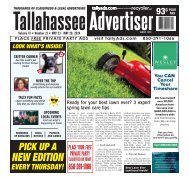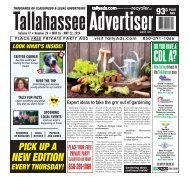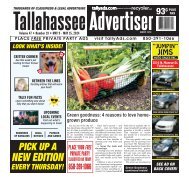TLA51_AllPages
Create successful ePaper yourself
Turn your PDF publications into a flip-book with our unique Google optimized e-Paper software.
Katie Breitschopf says wheel covers should be<br />
considered, too.<br />
“FlowBelow’s Trailer Wheel Covers have been<br />
track-tested to save 0.81% on fuel, and (were)<br />
road-tested by several mega-fleets to show an<br />
even higher return,” she remarked. “The covers<br />
pay for themselves in Year 1 or early in Year 2,<br />
and they deliver returns for the remaining life of<br />
the asset. That makes the ROI incredibly attractive.”<br />
Breitschopf recommends wheel covers to every fleet,<br />
along with side skirts, where applicable.<br />
“We don’t sell them, but we recommend trailer skirts; their<br />
bang for the buck is huge,” she said.<br />
Carriers looking for additional fuel savings can find it in<br />
another FlowBelow product.<br />
“Our AeroSlider, which is a kit that includes wheel covers<br />
and fairings that smooth the turbulent air flow across the<br />
wheels of the trailer, as well as flow-through mudflaps, has<br />
been SmartWay certified to save 2.07% in fuel,” explained<br />
Breitschopf.<br />
FlowBelow wheel covers and fairings are offered as standard<br />
equipment on some tractor models. Breitschopf hopes<br />
trailer OEMs will follow suit.<br />
Another product, this one manufactured by Eco Flaps, is<br />
a specially designed flow-through mud flap that claims to<br />
improve fuel economy by more than 1%. Rather than simple<br />
slots in the mud flap to allow air to pass through, the Eco<br />
Flaps product features molded, wing-shaped channels that<br />
reduce air resistance and, as a bonus, greatly reduce the<br />
amount of road spray in wet conditions.<br />
Improving aerodynamics isn’t the only way to maximize<br />
trailer fuel economy. Some carriers are looking at lift axles as<br />
an alternative to the usual tandem axles.<br />
“Some of the main benefits of lifting an axle can include<br />
improved payload, operational flexibility, improved maneuverability,<br />
increased fuel efficiency, extended tire and component<br />
life, and reduced road tolls,” explained Hendrickson<br />
Director of Global Marketing and Communications Mark<br />
Slingluff.<br />
Lift axles have traditionally been popular for vocational applications<br />
such as dump or heavy-haul. Increasingly, buyers<br />
are looking at them for fuel-saving applications.<br />
“Hendrickson offers various lift kits on the Hendrickson<br />
suspension model and trailer design,” said Slingluff.<br />
Multiple options for operation of the lift axle are available,<br />
including those that integrate with the vehicle’s main suspension<br />
and those that operate independently. A “smart” option<br />
is offered that raises and lowers the axle automatically based<br />
on air spring pressure.<br />
Lift axles aren’t the only way suspension options can save<br />
fuel, however. Hendrickson also manufactures tandem axle<br />
slider suspension systems for trailers, including dry van and<br />
refrigerated units. Their ULTRAA-K UTKNT 40K offering is<br />
touted as “the lightest slider system in the industry by nearly<br />
100 pounds,” according to the company’s website.<br />
It pays to learn about suspension options offered by OEMs,<br />
including the weight savings of individual components.<br />
Sorting through the mountain of fuel-saving claims of<br />
manufacturers can be a daunting task. Fortunately, real testing<br />
information for many products isn’t hard to find, thanks to<br />
Mesilla Valley Transportation Solutions (MVTS). The MVTS lab<br />
is an independent third-party testing organization formed with<br />
the partnership of Mesilla Valley Transportation and InnoMetric<br />
MPG, a testing provider for the racing industry.<br />
MVTS offers private testing for individual carriers and manufacturers,<br />
but also offers a list of certified products that includes<br />
testing results for each. Interested parties can find independent<br />
test data for many of the products they might consider adding<br />
to trailer orders. Test summaries as well as full testing reports<br />
are available.<br />
Test results are offered in terms of gallons of fuel saved for<br />
every thousand miles driven. Fuel savings are also expressed<br />
in terms of percentage, but this is considered a less accurate<br />
way to report results.<br />
MVTS-certified products include tires, lubricating oils, solar<br />
panels, and other products, in addition to aero products. One<br />
product, a grill guard for protecting the front of the truck, was<br />
tested for potential increase in fuel consumption, which proved<br />
to be minimal.<br />
Purchasing trailers can be as simple as choosing a trusted<br />
brand at the best price, but purchasers who carefully consider<br />
fuel saving options may find the ROI to be well worth the time<br />
it took to research the options.<br />
TCA NOVEMBER/DECEMBER 2021 WWW.TRUCKLOAD.ORG | TRUCKLOAD AUTHORITY 13



